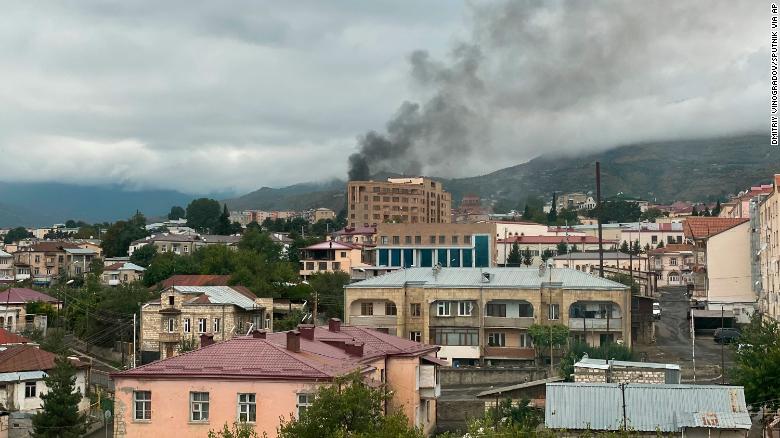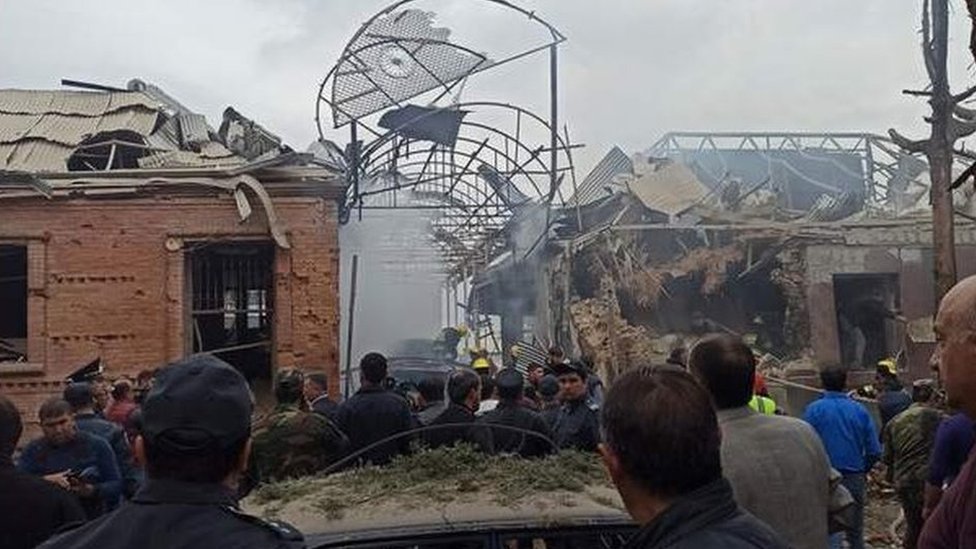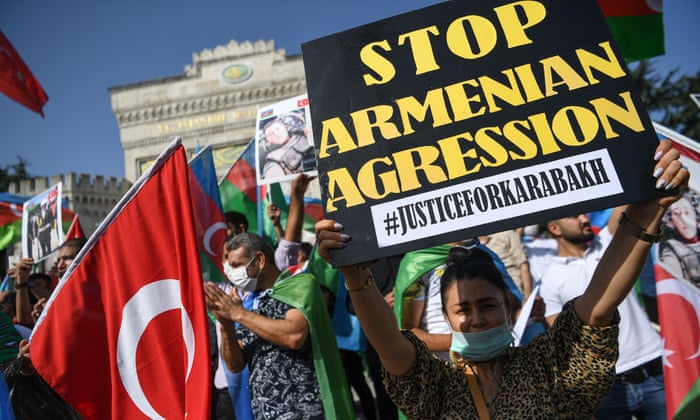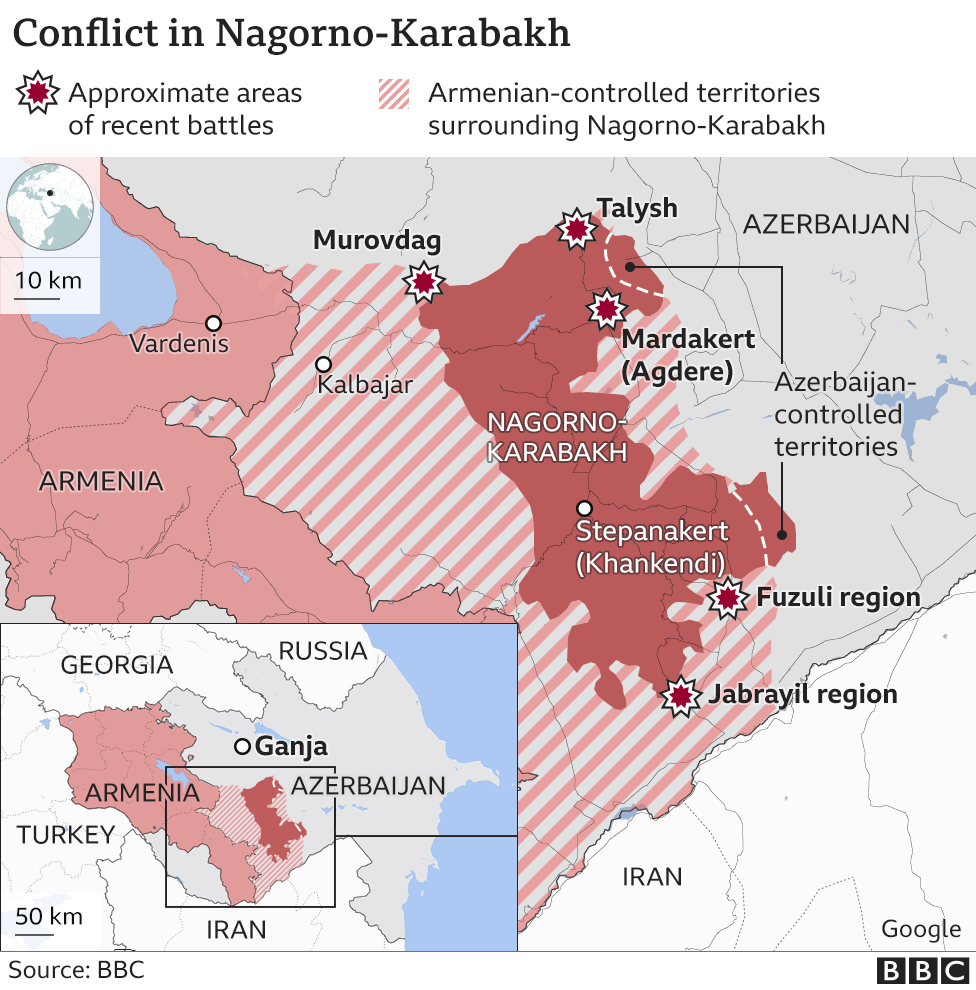"We saw some Azerbaijan drones in the sky looking for targets, but we didn't think the fire station would be a target because we're a humanitarian service."
"Now it's going to make it harder for us to rescue innocent victims of this war. They are doing this shelling just to cause panic among people."
Armen Naremanian, senior firefighter, Stepanakeri, Nagorno-Karabakh
"I am not scared. I was fighting in 1988 and killed many Turks and mujahedeen who were fighting then."
"And as for these rockets? I will cut the tubes in half, and use them as troughs to feed my pigs."
Yura Arzumanian, 52, farmer, veteran of the 90s war
"Mil objects in large cities of Azerbaijan are the target of the
Defense Army of #Artsakh [Armenian name of Nagorno-Karabakh]."
"Calling on Azerbaijani population to leave
these cities to avoid inevitable loss."
"Currently firing stopped upon my command to avoid loss among
#civilians. Failing Azerbaijani military-political leadership to draw
appropriate lessons, our commensurate response will pursue. Determined
as never. #Azerbaijan can still stop its aggression."
Nagorno-Karabakh leader Arayik Harutyunyan
"The Ministry of Defense of the Republic of #Armenia formally declares
that no fire of any kind is being opened from the territory of Armenia
in the #Azerbaijan's direction."
Shushan Stepanyan, press secretary, Armenia's Defense Minister
 |
| Smoke rises after the recent shelling, in Stepanakert, Nagorno-Karabakh. CNN |
"The
information spread by the Armenian side about the alleged shelling of
military facilities in Ganja city is provocative and false."
"As a result of enemy fire, civilians, civilian infrastructure and ancient historical buildings were harmed."
Azerbaijan Defence Minister Zakary Hasanov
"Indiscriminate Missile attacks are launched against Ganja, Füzuli,
Tartar and Jabrayil cities of Azerbaijan from territory of Armenia. "
"Ganja is the second biggest city of Azerbaijan. 500.000+ population."
Hikmet Hajiyev, foreign policy aide, Azerbaijani President Ilham Aliyev
"Nagorno-Karabakh is our land. [Armenian forces] must leave
our territories, not in words but in deeds, [provide a timetable for a
full withdrawal, and recognize the territorial integrity of Azerbaijan]."
"This is the end. We showed them who we are. We are chasing them like dogs."
Azerbaijani president Ilham Aliyev
 |
Several buildings in Ganja were destroyed, Azerbaijani officials say Azerbaijan Defence Ministry
|
Arayik Harutyunyan, Nagorno-Karabakh's Armenian leader confirmed his forces had targeted a military airbase in Ganja over the border in Azerbaijan, identifying it as the source of missiles landing in Nagorno-Karabakh. He had decided to stop shelling the city of a half-million, said to be Azerbaijan's second-largest city, to avoid hitting innocent civilians. But he put Azerbaijan on notice that if it continued shelling his enclave, there would be consequences; warning it now considers "military facilities in Azerbaijan's big cities" to be legitimate targets for response to Azeri attacks.
This is nothing but typical of Islamic warfare, to establish bases and arms caches within civilian populations. Also typical, is the shelling by those same Islamic militaries of civilian institutions such as firehalls, medical clinics and hospitals. It has been seen in Syria's Alawite regime's shelling of hospitals in territories held by majority Sunny Syrian rebels, along with the bombing of bread lines, clinics and civilian enclaves where most homes sheltered Syrian Sunnis. The famed White Helmets rescue missions were bombed,as well, by Syrian warplanes.
The aggressor here is clearly Azerbaijan, fixated on recapturing the breakaway enclave of Nagorno-Karabakh as Azerbaijani territory. The ethnic Armenian majority that now represents the enclave's population base and its leaders are under fire and they're fighting back equally determined to protect the geography they defend as their own. There are parallels to ethnic Russian-Ukrainians in eastern Ukraine mounting their separatist movement and Russia's capture of Crimea. Russia is on the support side of Armenia, clearly a religion-and-ethnic bias.
Firefighter Armen Naaremanian foresaw being involved in the protection of his city of Stepanakert, the capital of Nagorno-Karabakh, but as a firefighter, not as a member of the military; he hardly anticipated that his fire station would become a target of Azeri shelling. Now he is tasked like the Syrian White Helmets, with rescuing people out of bombed-out buildings and in the process himself running for cover from the rockets launched from Azerbaijan.
 |
| Pro-Azerbaijan protesters in Istanbul, Ozan Köse/AFP/Getty Images
|
A constant barrage of Azeri artillery has hit in and around Stepanakert in the past week, some striking military targets, while others came down into nearby hills and gorges, and some destroyed civilian homes and farmsteads. Stepanakert has become a deliberate target for Azerbaijan in its campaign of aggression, aided by Turkey's Recep Tayyip Erdogan, calling up his Islamist terrorist allies in the process, promising to be with Azerbaijan to the very end, until it has achieved its goal.
Azerbaijan considers the ethnic Armenian-ruled Nagorno-Karabakh an insulting blow to its honour calling out for retribution and recapture into its sovereign geographic holdings. When thirty years ago Armenian-dominated Nagorno-Karabakh fought for independence it chose Stepanakert as its capital of the breakaway enclave, today a city of 50,000. That earlier war's brutal bombing campaign where 40,000 died, can still be seen in unrestored buildings in some areas. Farmland close to the Azeri front lines cannot be worked because of landmines.
In the past decades there have been skirmishes leading to the deaths of an estimated 3,000, many of those deaths by snipers firing from front lines. Initially the two sides were matched for military numbers with the Armenians of Nagorno-Karabakh receiving military and political support from Armenia. Since then oil wealth enjoyed by Azerbaijan has weighted assaults in its favour. Alongside Turkey's support Azerbaijan has acquired new drone weaponry to target the old Soviet-era tanks that comprise Nagorno-Karabakh's military armamentarium.
Atepanakert is in preparations for a siege, with hotels and local houses sheltering women and children evacuated from outlying villages. Proprietors of shops and businesses have volunteered for the front lines, closing their businesses temporarily. Residents are ordered regularly to take cover in bombproof shelters, by air raid sirens. The city switches its lights off at night to avoid being a target for drone attacks. French president Emmanuel Macron criticizes Turkey's Erdogan for sending Syrian jihadis to fight alongside Azerbaijani forces.
Even so, Ilham Aliev, the president of Azerbaijan insists the "ball was in the court of Armenia", which must withdraw its troops from Nagorno-Karabakh prior to any ceasefire discussions. That Nagorno-Karabakh's ultrapatriotic residents would concede defeat despite facing a superior military equipped with newer fighting technologies is beyond unlikely to occur. When veteran fighter of the original war in the 90s, Hura Arzumanian, woke up at the sound of three Azeri missiles landing in his farmstead acreage on the outskirts of Stepanakert which failed to explode he was undaunted.
With encouragement from Turkey's Erdogan, Azerbaijan has ignored calls from Russia, the U.S., France and the European Union for a ceasefire and an end to the violence. Instead, the conflict and the violence is increasing. The Karabakh cities of Stepanakert and Martakert have come under attack by Azerbaijani war jets and long-range missiles. A string of villages have been captured by Azerbaijani forces, while Armenia admitted ethnic Armenian fighters are under pressure in some areas, with a fluctuating situation on the ground.

Labels: Armenia, Azerbaijan, Conflict, Islamist Terrorists, Nagorno-Karabakh, Turkey




0 Comments:
Post a Comment
<< Home